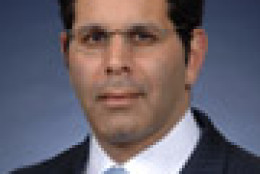Technology
-
The Office of Personnel Management revealed Thursday that the personal information of 4 million current and former federal employees may have been compromised during an April cyber attack on its IT systems.
June 04, 2015 -
The U.S. Agency for International Development is learning more about the countries it works with, thanks to a few new open data projects. The agency recently hosts its first-ever Open Data Hackathon. More than 100 participants worked on eight different projects. Alana Marsili, an open data specialist at USAID, led the Hackathon. She tells In Depth with Francis Rose about who participated.
June 04, 2015 -
Commentary: No metric can really capture the essence of any object or program, or the people\'s dedication to it, says Federal Drive host Tom Temin.
June 04, 2015 -
A recent cyber breach leaves the Internal Revenue Service with more questions than answers about its online authentication system. But the IRS knows the data systems it built decades ago aren\'t useful any more. Visitors to the agency\'s Get Transcript portal are easy targets, because hackers already knew the answers to many of the knowledge based authentication questions they answered to enter the portal. Jeremy Grant, an identity management consultant and former senior executive advisor for identity management at the National Institute of Standards and Technology, tells In Depth with Francis Rose about what lessons government learn about identity management.
June 03, 2015 -
The Pentagon\'s cyber teams have a new standard now, thanks to the work of the Marine Corps\' first National Cyber Protection Team. The 81 CPT built cyberspace training, technology and mission planning toolkits. The team has a group of experts who can respond to cyber incidents and analyze vulnerable networks across any government agency. The 81 CPT wins a Government Information Security Leadership Award from ISC(2). Capt. Robert Johnston is the team leader of the 81 Cyber Protection Team. He tells In Depth with Francis Rose about some of the innovative cyber techniques that the team is developing.
June 03, 2015 -
Randy Miskanic, the Postal Service\'s acting chief information officer, said over the next six months 225,000 letter carriers and other employees will be using hand-held devices to collect and review data in real-time to help them make better decisions.
June 03, 2015 -
\"A resounding victory for Edward Snowden.\" That\'s how Senate Majority Leader Mitch McConnell described the passage of the USA Freedom Act late yesterday. The legislation, signed by President Barack Obama, will phase out the NSA\'s bulk phone records collection program over the next six months. Instead, phone records will stay at the phone companies and the government will need a warrant to access them. Stewart Baker is a partner at the law firm Steptoe and Johnson. He was the first assistant secretary for policy at Homeland Security and earlier spent two years as the NSA\'s general counsel. He also publishes a podcast on cyber law policy. He joined Tom Temin on the Federal Drive to talk about what\'s next for the NSA.
June 03, 2015 -
Events over the last year should have made it clear: Everyone, including those in the government, need to worry about cyber threats and rethink their strategies for dealing with them. That\'s according to a new worldwide security report out today. Compiled and published by Check Point Software, the report identifies a number of cyber issues on the rise. Jeffrey Schwartz is the vice president of North American engineering at Check Point. He joined Tom Temin on the Federal Drive with more on what\'s in the report.
June 03, 2015







